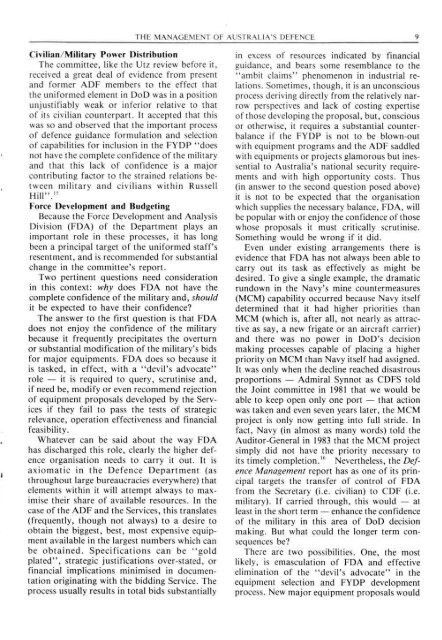ISSUE 70 : May/Jun - 1988 - Australian Defence Force Journal
ISSUE 70 : May/Jun - 1988 - Australian Defence Force Journal
ISSUE 70 : May/Jun - 1988 - Australian Defence Force Journal
Create successful ePaper yourself
Turn your PDF publications into a flip-book with our unique Google optimized e-Paper software.
THE MANAGEMENT OF AUSTRALIA'S DEFENCE 9<br />
Civilian/Military Power Distribution<br />
The committee, like the Utz review before it,<br />
received a great deal of evidence from present<br />
and former ADF members to the effect that<br />
the uniformed element in DoD was in a position<br />
unjustifiably weak or inferior relative to that<br />
of its civilian counterpart. It accepted that this<br />
was so and observed that the important process<br />
of defence guidance formulation and selection<br />
of capabilities for inclusion in the FYDP "does<br />
not have the complete confidence of the military<br />
and that this lack of confidence is a major<br />
contributing factor to the strained relations between<br />
military and civilians within Russell<br />
Hill"."<br />
<strong>Force</strong> Development and Budgeting<br />
Because the <strong>Force</strong> Development and Analysis<br />
Division (FDA) of the Department plays an<br />
important role in these processes, it has long<br />
been a principal target of the uniformed staff's<br />
resentment, and is recommended for substantial<br />
change in the committee's report.<br />
Two pertinent questions need consideration<br />
in this context: why does FDA not have the<br />
complete confidence of the military and, should<br />
it be expected to have their confidence?<br />
The answer to the first question is that FDA<br />
does not enjoy the confidence of the military<br />
because it frequently precipitates the overturn<br />
or substantial modification of the military's bids<br />
for major equipments. FDA does so because it<br />
is tasked, in effect, with a "devil's advocate"<br />
role — it is required to query, scrutinise and,<br />
if need be, modify or even recommend rejection<br />
of equipment proposals developed by the Services<br />
if they fail to pass the tests of strategic<br />
relevance, operation effectiveness and financial<br />
feasibility.<br />
Whatever can be said about the way FDA<br />
has discharged this role, clearly the higher defence<br />
organisation needs to carry it out. It is<br />
axiomatic in the <strong>Defence</strong> Department (as<br />
throughout large bureaucracies everywhere) that<br />
elements within it will attempt always to maximise<br />
their share of available resources. In the<br />
case of the ADF and the Services, this translates<br />
(frequently, though not always) to a desire to<br />
obtain the biggest, best, most expensive equipment<br />
available in the largest numbers which can<br />
be obtained. Specifications can be "gold<br />
plated", strategic justifications over-stated, or<br />
financial implications minimised in documentation<br />
originating with the bidding Service. The<br />
process usually results in total bids substantially<br />
in excess of resources indicated by financial<br />
guidance, and bears some resemblance to the<br />
"ambit claims" phenomenon in industrial relations.<br />
Sometimes, though, it is an unconscious<br />
process deriving directly from the relatively narrow<br />
perspectives and lack of costing expertise<br />
of those developing the proposal, but, conscious<br />
or otherwise, it requires a substantial counterbalance<br />
if the FYDP is not to be blown-out<br />
with equipment programs and the ADF saddled<br />
with equipments or projects glamorous but inessential<br />
to Australia's national security requirements<br />
and with high opportunity costs. Thus<br />
(in answer to the second question posed above)<br />
it is not to be expected that the organisation<br />
which supplies the necessary balance, FDA, will<br />
be popular with or enjoy the confidence of those<br />
whose proposals it must critically scrutinise.<br />
Something would be wrong if it did.<br />
Even under existing arrangements there is<br />
evidence that FDA has not always been able to<br />
carry out its task as effectively as might be<br />
desired. To give a single example, the dramatic<br />
rundown in the Navy's mine countermeasures<br />
(MCM) capability occurred because Navy itself<br />
determined that it had higher priorities than<br />
MCM (which is, after all, not nearly as attractive<br />
as say, a new frigate or an aircraft carrier)<br />
and there was no power in DoD's decision<br />
making processes capable of placing a higher<br />
priority on MCM than Navy itself had assigned.<br />
It was only when the decline reached disastrous<br />
proportions — Admiral Synnot as CDFS told<br />
the Joint committee in 1981 that we would be<br />
able to keep open only one port — that action<br />
was taken and even seven years later, the MCM<br />
project is only now getting into full stride. In<br />
fact, Navy (in almost as many words) told the<br />
Auditor-General in 1983 that the MCM project<br />
simply did not have the priority necessary to<br />
its timely completion. 16 Nevertheless, the <strong>Defence</strong><br />
Management report has as one of its principal<br />
targets the transfer of control of FDA<br />
from the Secretary (i.e. civilian) to CDF (i.e.<br />
military). If carried through, this would — at<br />
least in the short term — enhance the confidence<br />
of the military in this area of DoD decision<br />
making. But what could the longer term consequences<br />
be?<br />
There are two possibilities. One, the most<br />
likely, is emasculation of FDA and effective<br />
elimination of the "devil's advocate" in the<br />
equipment selection and FYDP development<br />
process. New major equipment proposals would

















